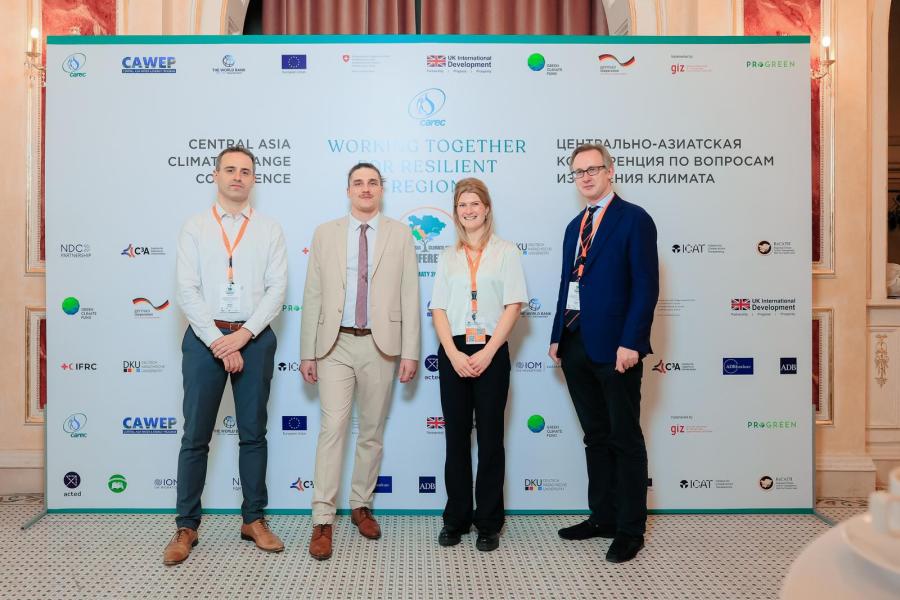C3A at the 2024 CACCC in Almaty
 C3A at the 2024 CACCC
C3A at the 2024 CACCC
Central Asia, a region known for its diverse landscapes and rich cultural heritage, is also becoming increasingly recognized for its proactive stance on climate action. In 2023, Central Asian nations collectively made significant strides in setting ambitious targets for reducing greenhouse gas emissions and strengthening their climate resilience.
These efforts were prominently showcased at COP28, marking a pivotal moment for the region’s environmental agenda. Building on this momentum, the 2024 Central Asia Climate Change Conference (CACCC-2024) orchestrated by the Regional Environmental Centre for Central Asia (CAREC) in Almaty, Kazakhstan, aims to further propel the region towards sustainable development. Scheduled for May 27-29, 2024, the CACCC-2024 promised to be a landmark event. This conference brought together policymakers, experts, and practitioners from various sectors to address critical issues related to water, energy, food security, and environmental sustainability within the context of a climate-affected Central Asia. It served as a platform to highlight the progress made by Central Asian countries in climate mitigation and adaptation, including their reporting under the Enhanced Transparency Framework.
Though a specific partnership with C3A, a significant focus of this year's conference was on climate finance. The event delved into practical climate initiatives being implemented across the region, aiming to bolster support for governmental and development partners, academia, and private sector efforts in turning climate ambitions into reality. This focus was crucial as Central Asia faces the dual challenge of mitigating adverse climate impacts while transitioning towards renewable energy sources.
The second day notably, C3A was invited to discuss climate policy related issues during several co-hosted events dedicated to Ministries of Finance’s potential role and needs: a panel discussion, 2 parallel sessions and a 2-days training on macro modelling for climate policy.
Highlighting Key Sessions
Green Innovation in Central Asia
The "Green Innovation" session emphasized the importance of low-carbon technologies like solar, wind power, and electric vehicles (EVs) for economic growth. Countries compete to attract related manufacturing, which promise job creation and reduced fossil fuel dependency. Finance ministries play a critical role by funding R&D and creating markets for these technologies. Kazakhstan and Uzbekistan focused on EVs, highlighting the benefits of electric propulsion systems and implementing strategies to promote green energy.
Fiscal and Debt Sustainability
The “Fiscal and debt sustainability” session, conducted with regional World Bank experts, explored fiscal risks and new revenue sources like carbon taxes. It emphasized balancing economic prosperity with environmental sustainability by modernizing energy systems and integrating renewables, as shown in the existing CCDR reports simulations using the MFMOD model. Recommendations included strengthening institutions for decarbonization, mobilizing green finance, and building capacity within financial institutions.
Training on Macro-Finance Modelling for Climate Policy
The C3A training on macro finance modelling highlighted tools for understanding the economic impacts of low-carbon transitions. Models like the Future Technology Transformations (FTT), the Financial Sector Mitigation and Adaptation Tool (FSMAT) as well as WB developed DSGE models were presented, as well as dynamic system modelling exercizes from regional modelling teams. The training underscored the importance of macroeconomic modelling in aiding policymakers during the low-carbon transition, but also the importance of building joint transition scenarios at the regional scale.
Towards a Resilient and Sustainable Future
The CACCC-2024 in Almaty represented a crucial step towards fostering regional cooperation and innovation in climate action and a great opportunity for C3A’s Central Asia Regional Hub. By bringing together diverse stakeholders, the conference aimed to address the pressing challenges of climate change and economic sustainability in Central Asia. The focus on green innovation, fiscal and debt sustainability, and the role of Ministries of Finance underscored the comprehensive approach needed to navigate this transition.
Central Asia stands at a crossroads, with the opportunity to lead in climate resilience and sustainable development. Discussions and outcomes of the CACCC-2024 will play a pivotal role in shaping the region's future, ensuring that economic growth and environmental stewardship go hand in hand. Through innovation, policy reform, and international cooperation, Central Asia can pave the way towards a prosperous and resilient future.
